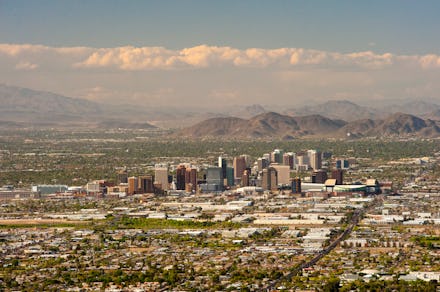While Obama Tries to Make Community College Free, One State's Abandoning It Completely

At the beginning of 2015, the the Obama administration unveiled a grand new plan to make community college free for Americans. Later this year, Tennessee will roll out its own ambitious new program to cover the full cost of a two-year college for all high school graduates. For future students and education policy observers alike, the initiatives have sparked a rare moment of optimism about a higher education system afflicted by an ever-rising tide of tuition costs.
But as a reminder that affordable, accessible education is far from guaranteed, Arizona has made a bold move in the other direction. The state government has decided to dramatically reduce funding for the two of the biggest community college districts in its state. The decrease is significant, but what's particularly notable about it is the finality of the next year's funding figure: zero dollars. The districts have been completely abandoned by the state government of Arizona.
Inside Higher Ed reports that the drying up of funding for the Maricopa and Pima districts comes after years of declining support from the state. As you can see in the chart below, the two received a collective $80 million or so in 2009, but saw a precipitous drop in 2012. Funding remained at the same low level for the next few years and will disappear completely in 2016:
"State aid has been an important part of the resources that we have available to us to serve students," Debbie Thompson, vice chancellor for business services at Maricopa Community Colleges, explained to Mic. "We very much understand the financial challenges that the state of Arizona has in their need to bring their budget into balance, but that being said we're disappointed the state isn't able to continue an investment in our community college district and Pima community college district."
While state aid makes up a small percentage of the district's operating budget, the vanishing of state aid does place additional strain on the colleges. The Maricopa system includes about 265,000 students, according to Inside Higher Ed.
"The main impacts are that there were some initiatives that we had planned to help to improve student success, and we will likely have to defer those until we have the resources," Thompson said.
Thompson highlighted the economic benefits of bolstering institutions central to reshaping the workforce at low costs. The return on state investment resulted in former students and other impacted individuals contributing over $7 billion to the local economy in the 2013-2014 fiscal year, she said.
An unusual trade-off: So what caused the disappearance of state aid for 2016? Auto registration fees.
According to the Arizona Republic, Republican legislators have determined that eliminating aid to two of the largest community college networks in the state would offset what they would have been a $6 or $7 bump in registration fees at the Department of Motor Vehicles.
The Arizona GOP's willingness to balance the state budget on the backs of students seeking affordable education is not unusual, unfortunately.
"This is a three-decade trend that, without much debate or fanfare or public discussion, the states have been gradually and consistently privatizing public higher education," Barmak Nassirian, director of federal relations and policy analysis at the American Association of State Colleges and Universities, told Mic.
Public higher education is more dependent than ever on tuition revenues due to cuts in government funding. According to a 2012 analysis from the American Council on Education, "average state fiscal support for higher education will reach zero by 2059" if the pace at which states are abandon public higher education continues.
"The big debate and discussion we're not having is when we cross that threshold, at what point can you say the state has completely abandoned its role and has de facto privatized its public infrastructure?" Nassirian said.
Obama's new proposal to make community college free offered a ray of light for education policy observers who have watched state support for public education disappear for decades. But the president's policy is only a proposal, and with Republican control of both chambers of Congress, its current prospects are dim.
Arizona's move is a reminder that momentum of history is unlikely to be slowed easily.